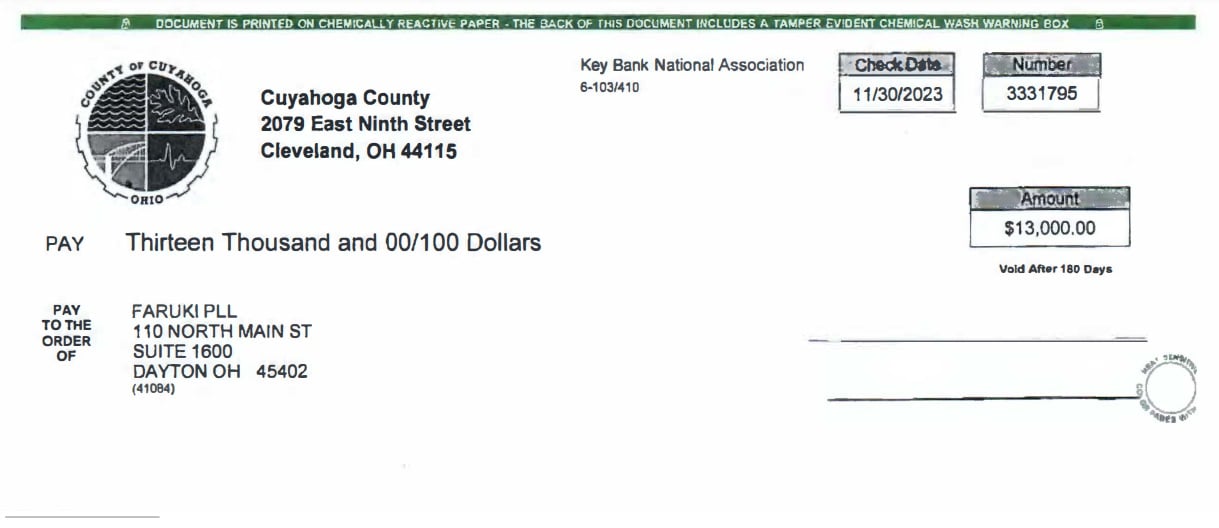The court clerk in Cleveland is now giving First Amendment access to new electronic pleadings as they are received, bringing back a tradition from the days of paper.
A settlement completed Friday between the clerk in Cuyahoga County Court of Common Pleas and Courthouse News also gives remote access to the pleadings through the court’s website.
In contrast to protracted legal battles with other state courts around the nation, the clerk moved quickly to settle a constitutional action brought in federal court. As a result, the cost of the legal fight dropped from millions to $13,000.
A check for that amount was received Friday by Jack Greiner at the Faruki firm in Cincinnati, who is representing Courthouse News in Ohio. The sum represents little more than that cost of drafting and filing the federal complaint.
The amount stands in contrast with checks for millions of dollars delivered by California and Virginia after losing scorched earth litigation with Courthouse News.
The difference is explained by the reasonable approach to questions of public access taken by individual clerks in some state courts and hardcore resistance by others. Intense litigation is currently underway in Maryland, for example, and approaching that level in Minnesota and Iowa.
In the big picture, courts all around America used to keep a wire basket or wood box on the counter where new civil complaints were put as soon as they crossed the counter. The press and public could check the box and see what was new any time during the day.
What happened was that in the switch to electronic records many state court clerks adopted a restrictive view of First Amendment access. They pushed a theory called “practical obscurity,” arguing falsely that paper records were traditionally difficult to find.
Under that credo, they withheld access to new civil complaints and other pleadings until clerks entered them into the docket. That inserted delay — sometimes a day but other times weeks — into the ability to look over and report on new pleadings, which often generate big news.
The hold-up and the damage it causes to fresh news makes little sense in the electronic era when information moves faster than in the past. And it contrasts with the old wire basket on the counter where the news in the filings could be reported right away, with no hold-up.
That old tradition is sometimes remembered by judges who worked as lawyers when courts ran on paper.
"There was a time when — and some in this room may remember it — when you took a pleading to the courthouse and the clerk stamped it physically and it went into different bins and it was available immediately,” said 8th Circuit Judge Bobby Shepherd last year. He was commenting from the bench during oral arguments in another Courthouse News case.
That was the way it was throughout Ohio, in Cincinnati, Cleveland, Columbus and Youngstown, when paper was the lawyers’ medium. And that is the way it will again be in Cleveland, except in electronic form.
As recited in the settlement terms: “The County Defendants have modified their previous practice and procedures such that newly filed and non-confidential civil complaints filed with the Cuyahoga County Clerk of Courts are posted on the Clerk's website immediately upon their receipt and prior to review or redaction by staff in the Clerk's Office.”
The new pleadings will stay there for a full day, which allows reporters to make sure they see everything filed on a given day: “Newly filed and non-confidential civil complaints shall remain posted in an unredacted form until midnight on calendar day following submission.”
The Cleveland court’s grant of remote access, protected through a username, password and other requirements, allows for reporting on cases filed late in the day, after the wood-and-concrete building has closed.
The modern electronic reality is that new pleadings are filed outside courthouse hours, clerks often work outside those hours, and judges issue rulings outside courthouse hours.
Fully 36 states now give remote access in at least one court in the state if not the entire state, and federal courts throughout the U.S. give remote access to records through the PACER system. In contrast, a minority of courts continue to limit public access to terminals in the clerk’s office during courthouse hours which generally run from 8:30 AM to 4:30 PM.
Though the clerk in Cleveland, Nailah Byrd, moved quickly to improve public access in her court, the same is not true in other Ohio courts. Courthouse News is currently challenging clerks in Dayton and Cincinnati on First Amendment grounds and those cases continue to generate legal bills without showing any signs of resolution.
Subscribe to Closing Arguments
Sign up for new weekly newsletter Closing Arguments to get the latest about ongoing trials, major litigation and hot cases and rulings in courthouses around the U.S. and the world.









